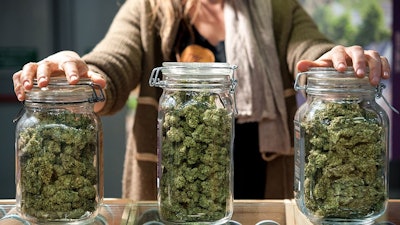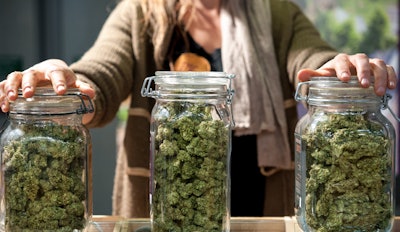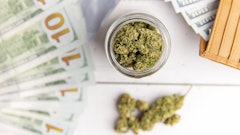

Behind the counter at Mosaic+ in downtown Oklahoma City, great glass jars stand like sentries. Within those enticing vessels, neatly trimmed buds await medical patients’ eager orders—for an eighth of Oversoul or a quarter-ounce of Gas Truffle or a half-ounce of MAC Stomper #8. Once the decision is made, a budtender opens the jar, reaches in and begins to weigh out the appropriate amount.
It’s a familiar scene, almost an archetype of the classic dispensary experience, but it’s fading fast.
Oklahoma is one of 19 U.S. states that continues to see this “deli-style” flower transaction in licensed retail shops. But perhaps not for long: The state legislature is zipping House Bill 4287 through the process of becoming law, which insists that cannabis producers pre-package their flower in specific amounts. This seemingly minor policy shift is not without controversy.
“Our job's not done until it's sold to the patients, and for them to not be able to really experience the flower before they purchase—it's just a really big concern of ours,” says Reid Colley, CEO of Resonant Cultivation and Mosaic+.
Routing flower through a pre-packaging process along the supply chain, even within a vertically integrated operation like Resonant’s, would alter the cost of doing business and the timeline from seed to sale. “Where will this really put the market?” Colley asks. “Especially for those craft growers who are fighting for shelf space against the mega-conglomerate that have the capacity to withstand all the cost that comes with packaging.”
RELATED: Resonant Cultivation Looks to Stand Out in a Crowded Market
Of all adult-use and medical cannabis markets in the U.S., those 19 states that allow deli-style dispensary transactions account for 58% of the U.S. market, according to Jay Czarkowski, licensing expert and founder of Canna Advisors. Another 14 states do not allow deli-style sales. (Some states are still working out the regulations around this issue, including New York, Virginia, Vermont, Mississippi and Alabama.)
And in medical-only states, the predominant policy is not to allow deli-style sales. Only seven states, including Oklahoma, currently allow this dispensary sales method.
Some states, like Pennsylvania, previously allowed deli-style sales, but then suspended that rule amidst the pandemic’s attendant public health concerns. Other states, like Maryland, have moved in the opposite direction, coming to the conclusion only recently that deli-style sales are permissible.
Each state in the cannabis space comes with its own market-based nuances, of course, but several high-level considerations come into play with the suspension of “deli-style” sales, such as Oklahoma’s current proposal. One major cause that observers are citing in Oklahoma is the fight against a strong illicit market. This concern is not unique to the state, but the nascent medical cannabis market has indeed seen a rise in illicit activity—both within its regulated boundary and without it.
“With the imbalance of supply in Oklahoma, having flower in branded packaging would make it easier to trace responsibility for illegally moving product across state lines,” Czarkowski says. “For medical markets, generally, there could also be considerations of less risk of contamination and more consistency and accuracy in labeling. Overall, though, with flower consistently being the top-selling category of cannabis products, it is no surprise that scrutiny and regulation changes continue on this product.”
In Oklahoma, off-the-books business is booming. In December 2021, the Oklahoma Bureau of Narcotics asserted that the state had become the No. 1 supplier of illegal cannabis in the U.S.
And, according to the bureau, this is not simply a matter of home-grow run amok. The bureau estimated that 25% of Oklahoma’s more than 8,000 licensed cannabis cultivators at the time were in some way connected to that illegal trade.
State regulators have made several efforts to clamp down more directly on any potential for diversion (including the implementation of a mandatory seed-to-sale tracking system via Metrc, which went live May 26). The pre-packaged flower bill is one possible path to that broader goal, one written and sponsored by lawmakers fed up with the otherwise sluggish rollout of guardrails by Department of Health. The bill is sponsored by Oklahoma State Rep. Lonnie Paxton, who has a history of working to tighten the state’s hold on the medical cannabis market. Another bill of Paxton’s recently passed the Oklahoma Senate; S.B. 1367 would ramp up criminal penalties for diversion.
“As many Oklahomans know, when State Question 788 was passed to legalize medical marijuana, we were quickly thrown into a situation where we needed to create the framework and guidelines for this industry,” Paxton said in a public statement. “Unfortunately, this led to the inadvertent mixing of medical marijuana legislation and criminal justice reform legislation.”
As the legislative session rounded the bend into its late-May conclusion, the idea of pre-packaging all flower products picked up some serious momentum.
The Oklahoma House passed the bill, 78-9, in late March. Then, the Oklahoma Senate passed the bill, 36-11, with some amendments. As of mid-May, the bill is back in the Oklahoma House Conference Committee on Alcohol, Tobacco and Controlled Substances, awaiting further debate.
“It's pretty clear to me that that is the main goal behind almost all of the legislation that we're seeing: to crack down on the illicit market,” says Kaimbri White, a partner at Climb Collective in Oklahoma City. “Unfortunately, it feels like the good actors, such as Mosaic and Resonant, are being thought of as an afterthought. [The legislators] are not really thinking about how this will affect the people in the industry who are trying to do things right and provide an adequate and even enjoyable a patient experience.”
But in the event that the bill passes into law, how might day-to-day operations change for licensed growers?
The fact is that retail sales data will become more important upstream, where producers will need to plot out the supply of different product quantities to meet overall patient demand. Flower can’t just be sold plainly into the market; it must be segmented into more specific SKUs, like a half-gram bag or a two-ounce bag. Therein lies the real back-end policy shift.
“If we’re having the prepackaged [flower] with a variety of sizes from half-gram to two to three ounces, how in the world do we plan how we're going to increment this out for customers?” Colley asks. “And not just at our own store, but across the other several dozen stores across the state that we supply to? How in the world are we going to actually do this without wasting a bunch of product that ends up not getting sold in increments or just dries out? I've had definitely a few nights where I've laid in bed and really started visualizing in my brain: If this becomes a reality for us, what do we do?”
To prepare for the likeliest scenario of this prepackaged policy, the Resonant and Mosaic+ teams have begun experimenting with different workflows and different increments of batch sizes. By studying the retail data they’ve gathered in-store (since opening in April 2021), the team can begin to think through those exact metrics.
The same will go for the broader medical cannabis marketplace—the wholesale destinations for their flower products. In this way, the retail segment of the industry will need to get that much more intertwined with the cultivation segment.
“My fear is that product gets put in the package and sits in a vault somewhere at another dispensary while it's waiting to be sold,” Colley says. “As we all know, flower is going to deteriorate and degrade over that time period. THC and potency and terpenes—all of that will degrade. You're going to lose moisture, it's going to dry out. That’s as opposed to how we’ve been able to store it in the way we do now, where we can keep it in more of a bulk storage [setting]. That way, the product is not one bud drying up by itself, but a whole collective of buds that creates somewhat of a climate within the container where they can maintain humidity and moisture. [In the dispensary,] we can also manage how we expose it to light, how many times you open that jar, and so on.”
As with everything else in cannabis, that’s easier said than done.
It might be a small thing: the presentation of a cannabis product in the dispensary environment. But the experience is a big thing, part of the larger promise of what’s being sold.

























